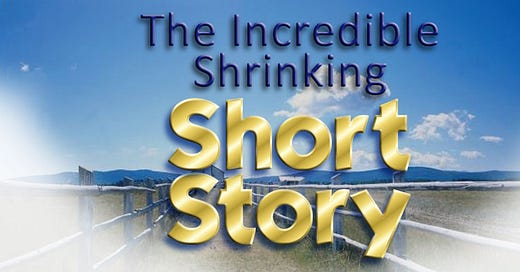The Incredible Shrinking Short Story
In an age of tweets (x-posts?), flash fiction, and corresponding attention spans, the short story has considerably shrunk
In the age of social media where shorter is better and often fewer than 10 words, online literary magazines usually focused on flash fiction (100-1,000, depending on the publisher), and anthologies with very restricted word counts (many less than 3,000), the whole concept of “story” has changed. But I can’t leave out television (and its predecessor—radio programs like The Shadow) that got us used to complex situations being wrapped up lickety-split in two hours, one hour, or even thirty minutes (actually less because of commercial breaks). And now we have YouTube, Rumble, Vimeo, Instagram, and Tik-Tok feeding us video snippets that some claim are meant to sway us to certain ways of thinking.
How do you develop characters, have any kind of plot line (let alone an arc), and include any meaningful descriptive text in such brief missives? It’s challenging, yes, but more frustrating for both writers and readers. Yes, there are still readers out there who don’t want to read some snippet. They want a full on story. (I had someone acting as a judge for a short story contest on Substack actually say she was disappointed at not knowing more about the characters. The piece was a little over 500 words. How much about these characters could I squeeze into that space? Sheesh!)
So what the heck does “story” even mean nowadays? Is the whole concept dead or just stunted?
A Definition
First, set aside the terms “short story” (word count limits range from 1,000 to 17,500, depending on the publisher) and “novellas” (word count limits range from 10,000 to 45,000, depending on the publisher). Such works are stories in a shortened form and as such prove my point that a story is a much longer work with far more depth.
A true story has character development, including some of the characters’ back-story, a well- and fully-developed plot with conflict and resolution and some logical progression from one to the other, and verbiage that places your readers in the story, not just outside the window, knocking to be let in. If you are skilled enough to squeeze all that into a shorter word limit, well and good. Otherwise, go for that longer limit.
The Impact on Literature
Having recently cut a WIP down from 55,000 to fewer than 20,000, I saw first-hand how this shortening process did both good and bad things:
Good – confusing subplots were eliminated
Bad – a richer plot weaving was lost
Bad – fitting in character back-stories had to be cut or extremely minimized
Bad – some heart-warming mother-daughter scenes had to be cut
Good – there’s more focus on the MCs
Bad – overall, it seems a bit rushed at the end (but I’m still working on it)
The impact on the writer is working harder on the plot elements and character items in a tighter, cleaner way to improve things and stay within the publisher’s limit.
The impact on the reader is generally that he or she has a simpler story that might be a bit clearer but lacks much of the richness of the original as well as richness of language so prevalent in much of what is considered “classic” literature (such as Dickens and Austen). Many readers have come to prefer such an approach to storytelling, better fitting reading them into busy lives. But imagine what these works would be like with most of their “guts” gone:
Les Misérables (Victor Hugo) – a cop chases an escapee and eventually finds him (no mention of the people the escapee helps and the struggle going on inside the cop chasing him, and no view of the societal ills affecting them both)
Gone With The Wind (Margaret Mitchell) – a Southern belle struggles through a war and dealing with the aftermath (no mention of the man she really loves who marries another woman, the man the Southern belle marries even though he is engaged to her sister to get ahead – just her, the war, and the Northerner she marries after becoming a widow which wouldn’t have happened since she wouldn’t have married her sister’s fiancé in the first place)
Pride and Prejudice (Jane Austen) – a young woman dislikes a rich young man but eventually discovers the truth about him (no mention of her distraught mother, her four sisters, the rich young man’s haughty aunt and anemic daughter, and the climatic event that brings together the young woman and the rich young man)
Atlas Shrugged (Ayn Rand) – a young inventor quits his job and encourages others to do likewise in protest over those who leech off them (no mention of the steel maker whose new metal is stolen by the government, a railway’s struggle to survive under increasingly difficult conditions imposed by the government, and the valley where many of the quitters have gone to live in peace and prosperity)
That doesn’t mean that shorter works can’t be entertaining. They are just far more shallow—like eating a salad that has only a couple of lettuce leaves and no dressing. And yes, even flash fiction and “drabbles” can convey quite an impact on the reader, as this writer and this one on Substack shows in his short missives.
Final Note
Now, I am going to say something that maybe should have been said upfront: the better writer you are, the more successful you will be at conveying more complex stories in those shorter word counts. On the flip side, if your story needs more words, write them. In fact, write and write and write and then edit and edit and edit. Pierre and Marie Curie processed down tons (literally) of pitch blend to get uranium (a mere spec in a little white bowl). Michelangelo carved his “David” out of a huge hunk of marble. You are better off paring down than trying to bloat up, as my recent experience with that novella has shown.
Hope you found this helpful and have been inspired to start and/or continue writing!
See my article: Publisher Agent Fiction Genres Defined, with downloadable PDF.
Please check out my works in progress (WIPs). And thanks for reading.
Disclaimer: I get no compensation for links to other sites and/or products in this post or on my site.







As a writer of long fiction, I have to say I agree with everything here. I no longer feel the necessity to seek out a publisher that accepts stories of length; I write the story that needs to be written, as the story itself dictates. I write with the intention of putting everything I write up on SUBSTACK alone. Rather than becoming published through conventional means, I hope to make this platform that means. Take a look inside. https://benwoestenburg.substack.com
Like Ben Woestenburg, I believe stories end up being the length they need to be. It's probably the same for book length, but if some cutting is needed, there is more wiggle room. I recently dropped an 85K down to 75, because that was the publisher's upper limit, and I managed it by trimming a little fat here and there (I doubt my beta readers will spot the difference.) Short stories, I let go wherever. It can go to 6000 or 1500. My sweet spot is between 3 and 4. I test myself from time to time, attempting Shotgun Honey's Gauntlet - a story in less than 700 words. It's challenging, but the results can be exciting. I'm insanely proud of this one, for instance. I'm curious to hear what you think about it... https://shotgunhoney.com/fiction/maybe-i-love-you-by-m-e-proctor/